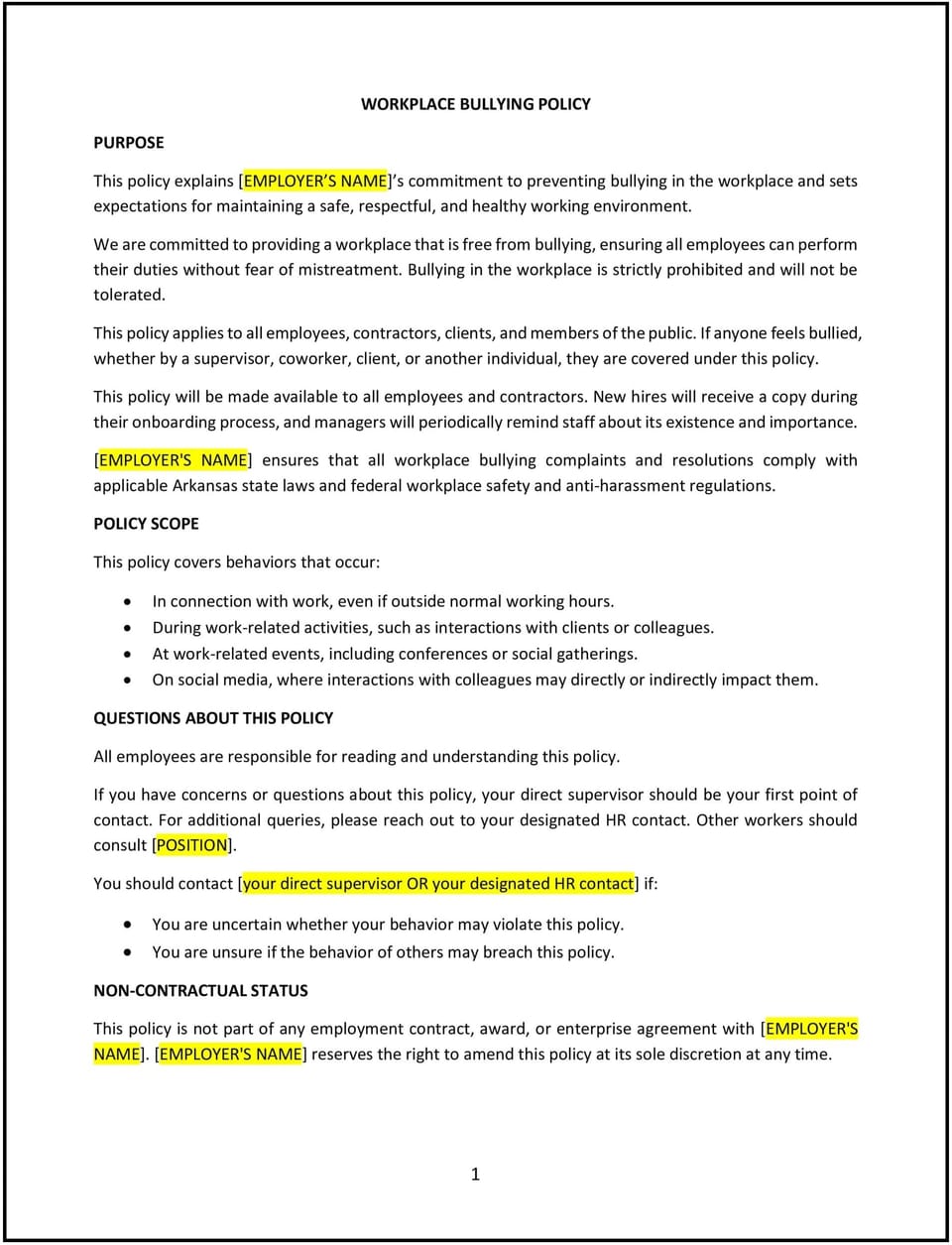Workplace bullying policy (Arkansas): Free template

Workplace bullying policy (Arkansas)
In Arkansas, a workplace bullying policy provides businesses with guidelines to address and prevent bullying behaviors in the workplace. This policy defines unacceptable conduct, establishes procedures for reporting incidents, and outlines steps for resolving issues to promote a safe and respectful work environment.
This policy helps Arkansas businesses reduce risks associated with bullying, foster employee well-being, and comply with applicable labor laws. By implementing this policy, businesses can maintain a positive workplace culture and mitigate potential legal or reputational risks.
How to use this workplace bullying policy (Arkansas)
- Define bullying: Clearly describe what constitutes workplace bullying, including verbal, physical, and non-verbal behaviors, such as intimidation, exclusion, or public humiliation.
- Establish reporting procedures: Provide employees with a confidential process for reporting incidents, including contact points and documentation requirements.
- Outline response protocols: Detail how the business will investigate reports of bullying and resolve issues fairly and promptly.
- Communicate consequences: Specify disciplinary actions for confirmed instances of bullying, ranging from warnings to termination, depending on severity.
- Promote awareness: Educate employees and managers about the policy and provide training on recognizing, preventing, and addressing bullying.
Benefits of using this workplace bullying policy (Arkansas)
This policy offers several advantages for Arkansas businesses:
- Promotes a respectful workplace: Encourages professionalism and mutual respect among employees, fostering a positive work culture.
- Reduces legal risks: Helps the business address bullying incidents proactively, minimizing potential liabilities or disputes.
- Supports compliance: Aligns with Arkansas labor laws and federal workplace regulations to ensure lawful handling of bullying issues.
- Enhances employee trust: Demonstrates the business’s commitment to creating a safe and supportive work environment.
- Encourages accountability: Establishes clear expectations and consequences for bullying behaviors, promoting adherence to workplace standards.
Tips for using this workplace bullying policy (Arkansas)
- Address Arkansas-specific considerations: Reflect any state-specific workplace standards or cultural norms in the policy.
- Train employees and managers: Provide training to help staff recognize bullying behaviors and understand reporting and resolution processes.
- Encourage open communication: Foster an environment where employees feel comfortable reporting concerns without fear of retaliation.
- Document incidents: Maintain thorough records of reported incidents, investigations, and resolutions to ensure transparency and accountability.
- Review regularly: Update the policy to reflect changes in laws, workplace dynamics, or best practices for addressing bullying.
Q: How does this policy benefit the business?
A: This policy promotes a positive workplace culture, reduces risks of legal disputes, and ensures a structured approach to addressing bullying incidents.
Q: What behaviors are considered workplace bullying under this policy?
A: Bullying includes behaviors such as verbal abuse, physical intimidation, exclusion, humiliation, or any actions that create a hostile work environment.
Q: How does this policy support compliance with Arkansas laws?
A: The policy aligns with applicable labor laws and workplace standards, ensuring fair and lawful handling of bullying complaints.
Q: What steps should employees take to report bullying?
A: Employees should report incidents to their manager or designated contact, providing detailed information about the behavior and any supporting evidence.
Q: How can the business address reported incidents of bullying?
A: The business should investigate reports promptly, document findings, and take appropriate disciplinary or corrective actions to resolve the issue.
This article contains general legal information and does not contain legal advice. Cobrief is not a law firm or a substitute for an attorney or law firm. The law is complex and changes often. For legal advice, please ask a lawyer.


